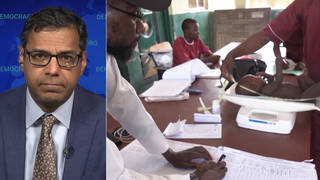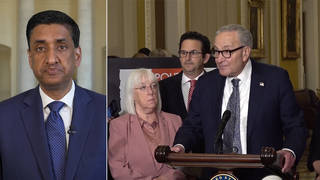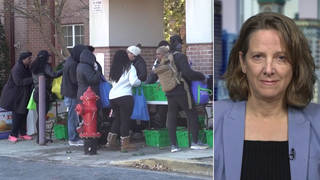HeadlinesApril 06, 2015
Kenya Hits Al-Shabab in Somalia After Garissa Massacre
Kenya has launched strikes inside Somalia following last week’s massacre by the militant group al-Shabab. A reported 148 people, mostly students, were killed when gunmen stormed the Garissa University College. The attackers went through the university dorms, separated Muslims from Christians, and killed the Christians. The Kenyan military says it has bombed several al-Shabab bases in retaliation. The strikes come as Kenya has begun three days of mourning. On Sunday, family members lined up at a morgue to identify their loved ones. A teacher from the Garissa region said the government failed to heed calls for protection.
John Nyongesa: “If the government took initiative and had listened to us, today we would have safeguarded the lives of 147 students who perished the other day. We want to appeal to the government, let us put pride away, because we are not going to continue losing Kenyans in such a way. If they don’t listen today, then it means they are waiting for another bigger number, because they were asking, 'Other than the 28 teachers who were killed, do we have any other?' They now have an answer. Northeastern is not safe. Let the government take responsibility because the information had flown.”
One of the four gunmen has been identified as the son of a Kenyan government official. Al-Shabab has called the attack revenge for Kenya’s military operations in Somalia as well as for the mistreatment of Kenyan Muslims. It was the group’s deadliest attack to date and the worst in Kenya since the 1998 bombing of the U.S. Embassy.
Obama Seeks Public, Congressional Backing of “Robust and Verifiable” Iran Deal
President Obama is pushing for public and congressional support of the landmark framework agreement on Iran’s nuclear program. In his weekly address, Obama called the deal the best of all options.
President Obama: “I expect a robust debate. We’ll keep Congress and the American people fully briefed on the substance of the deal. As we engage in this debate, let’s remember, we really only have three options for dealing with Iran’s nuclear program: bombing Iran’s nuclear facilities, which will only set its program back a few years while starting another war in the Middle East; abandoning negotiations and hoping for the best with sanctions, even though that’s always led to Iran making more progress in its nuclear program; or a robust and verifiable deal like this one, that peacefully prevents Iran from obtaining a nuclear weapon.”
Speaking to The New York Times, Obama said the United States will preserve the ability to “snap back” the sanctions should Iran violate the deal’s terms. Obama also called Iran’s supreme leader, Ayatollah Ali Khamenei, a “pretty tough read,” saying letters they have exchanged are filled with “a lot of reminders of what he perceives as past grievances against Iran.”
U.S., Iran Differ on Pace on Sanctions Relief under Final Deal
President Obama now faces the effort to sell the Iran deal to Congress as negotiators turn to a final agreement by June 30. But differences have already emerged in how the United States and Iran interpret the framework details. Speaking to Iranian state television, Foreign Minister Mohammad Javad Zarif said a final agreement would lead to the lifting of all international sanctions over Iran’s nuclear program. Zarif criticized the United States for releasing a “fact sheet” suggesting otherwise.
Foreign Minister Mohammad Javad Zarif: “The Americans have compiled a fact sheet of their own making. Well, some of the points in their sheet might indeed coincide with the text [of the framework agreement], but some of them are plain contradictions. We have protested about it. We said that the Americans are misrepresenting their position. We’ve said, 'Why are you saying this?' I have even brought the issue up with Kerry himself.”
Despite the differences over the pace of sanctions relief, Energy Secretary Ernest Moniz says the two countries’ public interpretations are consistent in “most dimensions.”
Netanyahu Campaigns Against “Historically Bad” Iran Deal
As the United States and Iran try to sell the agreement to domestic audiences, Israeli Prime Minister Benjamin Netanyahu continues his bid to undermine a final accord. Speaking to NBC’s Meet the Press, Netanyahu called the deal “historically bad.”
Israeli Prime Minister Benjamin Netanyahu: “I’m not trying to kill any deal; I’m trying to kill a bad deal. And you say it’s an historic decision, an historic deal. It could be an historically bad deal, because it leaves the preeminent terrorist state of our time with a vast nuclear infrastructure. Remember, not one centrifuge is destroyed. Thousands of centrifuges will be left spinning uranium. Not a single facility, including underground facilities, nuclear facilities, is being shut down.”
Despite Netanyahu’s claim, the agreement would reduce Iran’s installed centrifuges by more than two-thirds.
Red Cross Seeks Fighting Pause in Yemen as Civilian Toll Mounts
The International Red Cross is seeking a 24-hour pause to fighting in Yemen to deliver urgent humanitarian aid. The death toll continues to rise amid clashes between Houthi rebels and forces loyal to President Abdu Rabbu Mansour Hadi in Aden. Saudi-led airstrikes continue to claim civilian lives, including at least nine members of a single family in a village outside the capital, Sana’a. Dozens of civilians have been killed in bombings attributed to the Saudi-led coalition so far. The Red Cross says it has received permission to fly in aid convoys, but warns Yemen’s crisis is “dire.” A number of foreign governments have evacuated hundreds of citizens from Yemen in recent days, though the United States is not among them. A U.S. citizen was reportedly killed in a bombing in Aden last week.
U.N.: “Grave and Desperate” Crisis Inside Palestinian Refugee Camp under ISIS Control
The United Nations is warning of a “grave and desperate” crisis inside a massive camp for Palestinian refugees overrun by the Islamic State in Syria. Islamic State fighters are now in control of most of Yarmouk after entering last week. There are reports of scores of dead residents, including by beheading. Hundreds of people have reportedly fled. Pierre Krähenbühl, the head of the U.N. agency for Palestinian refugees, issued a global appeal.
Pierre Krähenbühl: “(The situation) has never been as grave and desperate as it is now in Yarmouk Camp. It is a place that has been besieged for two years, where about 18,000 people have been surviving on very minimal assistance for a long time. And now, with the fighting intensifying, their lives are in immediate danger. I think here not only that there are the 18,000 civilians, but there are 3,500 children among them. And with the intensity of the confrontations, our call has been for parties to immediately suspend military operations that put civilians in danger.”
Yarmouk has been under siege by the Assad regime for nearly two years and repeatedly stuck in the crossfire of Syria’s civil war. With control of Yarmouk, ISIS is just a few miles from the center of the Assad regime’s Damascus stronghold. A Palestinian militia has clashed with ISIS fighters in defense of the camp. But the al-Qaeda-linked Jabhat al-Nusra has prevented other armed groups from reinforcing the fighters battling ISIS. According to The Wall Street Journal, wounded al-Nusra fighters have recently been treated in Israeli hospitals across the border as part of an apparent Israeli effort to tacitly back Sunni fighters opposed to Iran.
Rolling Stone Retracts University of Virginia Rape Story After Probe Finds Errors
Rolling Stone magazine has retracted a story about sexual assault and impunity at the University of Virginia after a months-long probe by the Columbia Graduate School of Journalism found several errors. The article centered on a student named “Jackie” who says she was gang-raped at a fraternity and then ignored by school officials. But Rolling Stone backed off the story last year after acknowledging discrepancies and raising questions about its source. The Columbia researchers found several missteps including failing to identify Jackie’s alleged attacker and not independently interviewing three of Jackie’s friends despite quoting them. The story’s reporter, Sabrina Rubin Erdely, has issued an apology, including to “any victims of sexual assault who may feel fearful as a result of my article.” The Columbia report notes UVA had a “flawed record of managing sexual assault cases.” From 1998 until the beginning of the fall semester, UVA has expelled 183 students for so-called honor code violations, like cheating — and none for sexual assault. Meanwhile, the Charlottesville police have kept Jackie’s case open, saying while they have not found sufficient facts to support her account, “That doesn’t mean something terrible didn’t happen to Jackie.”
Relatives of Missing Mexico Students Continue U.S. Protests
In New York City, relatives of two of the 43 students missing from the Mexican state of Guerrero for over six months participated in a 10-kilometer run Saturday to protest the ongoing disappearance of their loved ones. The Mexican government says the students were killed by gang members, but the families question that account and believe they are alive. Antonio Tizapa, the father of a missing student, wore a T-shirt which read, “My son is your son, and your son is my son.”
Antonio Tizapa: “That way we can show our government, the Mexican government, that wherever there is a Mexican, there is a lot of support. As you can see, there are several fellow Mexicans here, expressing their support for the cause of the Ayotzinapa 43 and making it clear to the government that it is not a closed case, as they would like it to be.”
Late last week, unknown protesters wrote the names of the missing 43 students and on the facade of the Mexican Consulate in New York City with the phrase: “Consulate accomplice.”
Most popular
- 1
- 2
- 3
- 4
Non-commercial news needs your support
Please do your part today.











Media Options